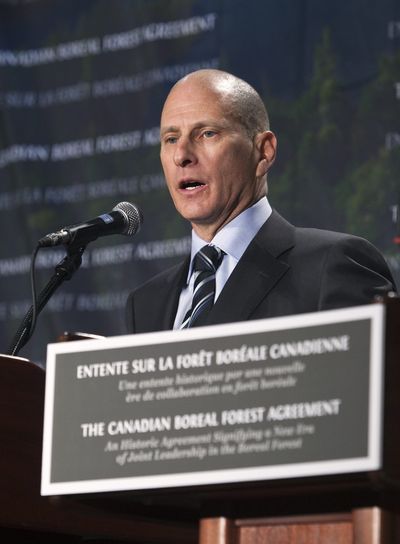Deal reached on Canada logging limits

TORONTO – Canada’s major pulp and paper companies said Tuesday they will restrict logging in environmentally sensitive areas of the country’s northern boreal forest as part of a groundbreaking deal with environmental groups.
The Forest Products Association of Canada, whose members include forestry giants such as AbitibiBowater Inc. and Weyerhaeuser Co. Ltd., said the industry has agreed to immediately suspend logging for three years on 75 million acres of boreal forest – roughly the size of Montana – where wildlife and habitat are endangered.
“We have identified a more intelligent, productive way to manage economic and environmental challenges in the boreal,” said Avrim Lazar, president and CEO of the association. “(It’s a) process that will set a forestry standard that will be the envy of the world.”
“The ecological significance of this (agreement) is very important,” said Duke University conservation ecology professor Stuart Pimm in North Carolina, “looking at the huge amount of carbon (dioxide) that would one way or another be put into the atmosphere if these forests were cut down. Internationally, the global environmental community is going to applaud Canada on becoming a major player for contributing to carbon capturing.”
The forest, consisting of wetlands and mostly coniferous trees such as spruce, fir and pine, is home to two-thirds of the country’s estimated 140,000 species of plants, animals and micro-organisms. The area is also a prime caribou habitat, and its preservation has been a major objective of environmentalists.
The corporate signatories, 21 members of the forestry organization, agreed to suspend logging in the region for three years so a plan can be developed to preserve the 36,000 woodland caribou that live in the region.
In exchange, environmental organizations have pledged to suspend international “Do Not Buy” anti-logging campaigns against Canadian lumber.
“This is our best chance to save woodland caribou, permanently protect vast areas of the boreal forest and put in place sustainable forestry practices,” said Richard Brooks, Greenpeace forest campaign coordinator and a spokesman for the nine participating environmental groups including Greenpeace, the Pew Environmental Group, ForestEthics and the Ivey Foundation.
Steve Kallick, director of the Pew Environment Group’s International Boreal Conservative Campaign, said Canada’s boreal forest rivals the Amazon in size and ecological importance, capturing and absorbing twice as much carbon dioxide as tropical forests, which helps fight global warming.
Kallick said the agreement took two years of negotiations between the two parties that have been at loggerheads over the issue for years. Pew, which brokered the deal, said it was the largest commercial forest conservation agreement ever concluded.